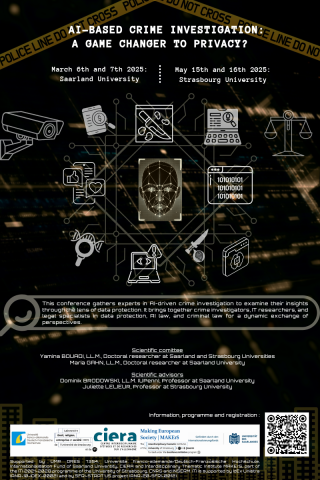Ce colloque sera dédié à l’exposition d’une perspective générale de la question de l’enquête par l’IA avec la présentation de certains usages liés aux infractions traditionnelles ainsi qu’aux usages de l’IA en matière d’enquêtes de nouvelles formes d’infractions comme la cybercriminalité. Il offre une opportunité de comparer les points de vue et les approches des chercheurs de centres de recherches européens (Allemagne, Belgique, Espagne, France, Luxembourg, Irlande du Nord, Pays-Bas et Portugal) en informatique et en droit (droit pénal, droit de la protection des données personnelles), ainsi que les contributions des professionnels de l’enquête pénale. Avec son approche interdisciplinaire (droit, informatique mais aussi questions sociologiques, philosophiques et politiques), ce colloque fait le point sur les enjeux au sein des organismes publics et criminels et examine les conséquences et impacts potentiellement perturbateurs inhérents à son déploiement.
Comment l’IA utilise-t-elle concrètement le traitement des données personnelles pour l’amélioration des enquêtes criminelles, et comment fonctionne cela d’un point de vue informatique (mise en œuvre technique du principe de « confidentialité dès la conception ») ? Quels sont ses défis juridiques en matière de vie privée ? Tels sont les questionnements autour desquels s'articule ce colloque.
Le colloque se tiendra en deux temps avec une première partie à Sarrebruck (Allemagne) les 6 et 7 mars 2025 et une seconde partie à Strasbourg les 15 et 16 mai 2025.

Programme
Part II: AI-Based digital forensics and investigations of cybercrime
May 15th 2025
University of Strasbourg
Room “Alex Weill” (5th floor)
Law Faculty / Faculté de droit, gestion et science politique
1 place d'Athènes
F-67045 Strasbourg Cedex
10h00 Arrival of the participants
Welcoming coffee
10h15 Opening words
- Prof. Jeanne-Marie Truffery-Andrieu, Dean of the Law Faculty of
Strasbourg.
- Prof. Mélanie Schmitt, Directrice of UMR DRES 7354.
10h30 Introductory words
Yamina Bouadi and Maria Gahn, co-organisers of the conference.
10h40 Keynote speech: How is implemented the concept of “privacy by design” in Machine Learning?
Ihsen Alouani, Associate Professor at Belfast University’s School of
Electronics, Electrical Engineering and Computer Science.
Panel 1: Who runs the online world? Data Miners and Web Crawlers!
Chair: Juliette Lelieur, Professor at the University of Strasbourg
11h10 The ‘algorithmic identity’ in the spotlight of law enforcement
authorities. Analysing expectations regarding the secrecy of online
communication
Janine Blocher, Doctoral researcher at Konstanz University.
11h30 Leveraging AI-powered Web Crawlers for Criminal Investigations: Revolutionizing Law Enforcement, Questioning Data Protection
Andreas Kanakakis, Doctoral researcher at the Luxembourg and Brussels Universities.
Discussions
12h15 Lunch break
Panel 2: Criminal investigations based on public spaces surveillance: biometric data included
Chair: Dominik Brodowski, Professor at the University of Saarbrücken
14h00 The political and legal implications of Algorithmic video surveillance for police work
Félix Tréguer, Associate Researcher at CNRS Center for Internet & Society, Member of La Quadrature du Net.
14h20 The implementation of privacy in Machine Learning through federated learning, holomorphic encryption
Thomas Lampert, Professor in Computer Science and AI at Strasbourg
University.
Discussions
Coffee break
Panel 3: Criminal investigations based on public spaces surveillance: biometric data excluded
Chair: (to be confirmed)
15h20 Application of European law to the French algorithmic video protection experiment – Its apprehension in national public law
Raphael Déchaux, Public law lecturer at Lorraine University (Metz).
15h40 Application of European law to the French algorithmic video protection experiment – Its apprehension in national criminal proceedings
Yamina Bouadi, Doctoral researcher at Saarland and Strasbourg
Universities.
Discussions
16h30 Closing remarks for the day
May 16th 2025
University of Strasbourg
Amphitéâtre du Collège Doctoral Européen
46 Boulevard de la Victoire
F-67000 Strasbourg
9h00 Arrival of participants
Welcoming coffee
Indoor garden of Collège Doctoral Européen (1st floor)
46 Boulevard de la Victoire, 67000 Strasbourg
9h30 Start of the conference
Place: Amphithéâtre du Collège Doctoral Européen (ground floor)
46 Boulevard de la Victoire, 67000 Strasbourg
Welcoming words by Maria and Yamina
Panel 4: AI-based online digital evidence gathering: obligations for law enforcement authorities, platforms and legal entities
Chair: Maria Gahn, Doctoral researcher at the University of Saarland
9h40 On the Legal Limits and Criminal Procedural Implications of Applying Artificial Intelligence in Corporate Internal Investigations
Túlio Felippe Xavier Januário, Doctoral researcher at Coimbra University.
10h00 Detecting human traUicking for sexual exploitation online: AI-related obligations for law enforcement authorities and platforms
Salomé Lannier, Post-doctoral researcher at Luxembourg University.
10h20 Digital Evidence Gathering: The Role of Legal Entities in Spanish
Criminal Proceedings
Marina Oliveira Teixeira dos Santos, Post-doctoral researcher at Salamanca University.
Discussions
Panel 5 - AI-based transborder crime investigation
Chair: (to be confirmed)
11h (online) AI-based border control from an IT point of view
Mohamed Genedy, Co-Founder and CTO of Trustec Valley.
11h20 The use of AI in transborder investigations: the ambivalence of EU law
Chloé Fauchon, Criminal law lecturer at Bayonne University.
Discussions
Lunch buffet (12h-13h30)
Place: Indoor garden of Collège Doctoral Européen (1st floor)
46 Boulevard de la Victoire, 67000 Strasbourg
Panel 6 – “World café” – French and German Master students’ exchange time with participants
13h30-14h30
Concept: Students (from Saarland and Strasbourg Universities) present their questions for their master research project (Seminararbeit) or in general for their personal and academic interest to small groups of speakers to receive pieces of advice, and inputs in methodology as well as in law/ technology/ comparative law.
14h30 Concluding remarks
End of the event
Date
-Lieu
Université de Strasbourg et Université de Sarrebruck